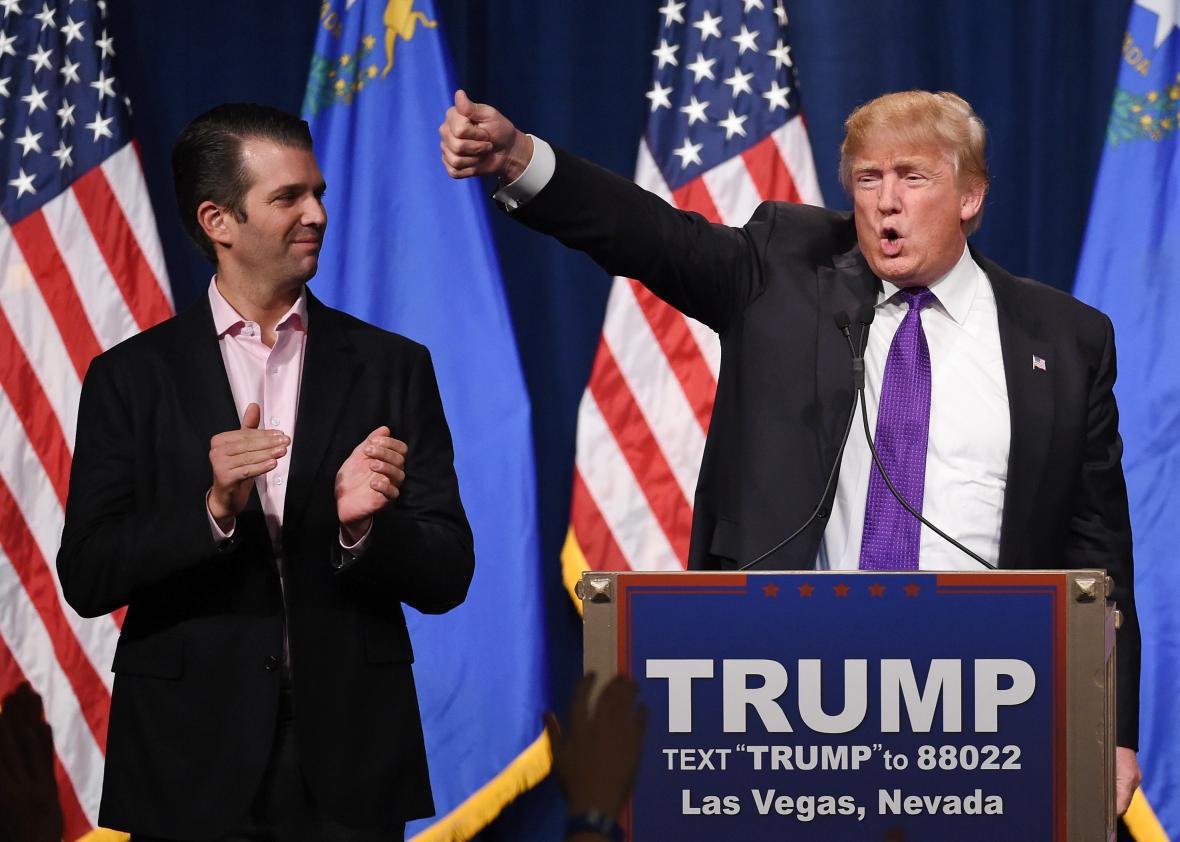On more than one occasion, Donald Trump has suggested that the official unemployment rate, which is currently sitting at 4.9 percent, is a “phony” number that makes the economy seem healthier than it is. The real unemployment rate, the one the experts don’t want you to see, is probably 18 percent, or maybe 21 percent, or 25, or 30, or 35, or 42 percent, the Republican nominee argues.
This is but one small front in the Trump campaign’s broader war on logic, fact, and math. Mostly, it is a convenient way for him to dismiss the labor market’s progress during the Obama era. But over the weekend, Trump’s son and surrogate, Donald Trump Jr., continued the assault during an interview with CNN’s Jake Tapper.
TAPPER: The crime rate is down overall nationwide and has been trending down, unemployment is much, much lower than when President Obama took office. Now, I’m not defending—
TRUMP JR.: Wait, wait, wait. Jake, let’s talk about that.
TAPPER: Go ahead.
TRUMP JR.: Let’s talk about the murder rate for cops skyrocketing. Let’s talk about the real unemployment rate. Because the way we actually measure unemployment is after X number of months if someone can’t find a job, congratulations, they’re miraculously off.
This is not, in fact, how the unemployment rate works. The statistic measures the percentage of Americans who are employed out of the entire workforce, which includes those who either have a job or are looking for one. If you lack a job but say you are hunting for one, you are considered unemployed, full stop. It does not matter if you have been sending out résumés for two weeks, six months, or two years—you are included in the denominator. Nobody “miraculously” disappears from the calculation. To say so is simply untrue.
Trump the Younger continues:
When you talk about underemployment which Obamacare has destroyed, people that are working 30 hours a week instead of 40 hours a week so companies don’t have to put them on Obamacare. When you talk about people that just aren’t even registered because they don’t count them anymore. They have been out of work for so long. They’d love to work if they could but they can’t that doesn’t count.
Here, Trump Jr. comes tantalizingly close to making a legitimate point. There is a reasonably large number of Americans who say they would like a job but have given up searching for one. The Bureau of Labor Statistics considers these so-called discouraged workers out of the labor force and therefore does not include them in the headline unemployment rate that the media widely reports each month. In this respect, the official figure makes the economy look sunnier than it is. It seems as if this might be the issue Trump Jr. is trying to gesture at, albeit a bit vaguely. However, he then flies back off into the realm of conspiracy:
These are artificial numbers, Jake. These are numbers that are massaged to make the existing economy look good and make the administration look good when in fact it’s a total disaster.
No. For the love of god, no. The BLS publishes lots of other unemployment (and underemployment) stats that give us a fuller picture of the economy. The broadest measure—called U-6—includes both discouraged workers and part-time employees who wish they had full-time jobs. That, too, has been trending down steadily over the Obama era. Nobody is hiding anything. What Trump Jr. is saying is absurd.
Along with the obviously troubling fact that the Republican presidential candidate is hellbent on eroding America’s faith in basic government institutions, this all raises some vexing logistical questions. If Donald Trump wins the presidency, as he well might, what economic indicators will he use? If he doesn’t trust any of the numbers currently coming from the BLS, will he appoint a commission to simply remake our economic stats? If so, that would put him in a strange position—he would need to find a number that looks terrible now but would steadily improve over his administration, which would be difficult, if not impossible. Or will he simply pronounce the health of the economy daily, based on his own feelings that morning? My money’s on the latter. That’s basically how he gauges his own net worth, after all.
